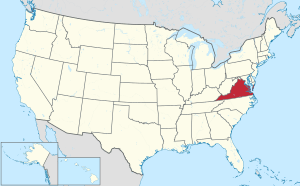Roanoke County, Virginia
Roanoke County is a county located in the U.S. state of the Commonwealth of Virginia. As of the 2010 census, the population was 92,376.[3] Its county seat is Salem.[4]
Roanoke County | |
|---|---|
Roanoke County Courthouse | |
 Seal | |
 Location within the U.S. state of Virginia | |
 Virginia's location within the U.S. | |
| Coordinates: 37°16′N 80°05′W | |
| Country | |
| State | |
| Founded | March 30, 1838 |
| Named for | Roanoke River |
| Seat | Salem |
| Largest town | Vinton |
| Area | |
| • Total | 251 sq mi (650 km2) |
| • Land | 251 sq mi (650 km2) |
| • Water | 0.7 sq mi (2 km2) 0.3% |
| Population (2010) | |
| • Total | 92,376 |
| • Estimate (2018)[1] | 94,073 |
| • Density | 370/sq mi (140/km2) |
| Time zone | UTC−5 (Eastern) |
| • Summer (DST) | UTC−4 (EDT) |
| Congressional districts | 6th, 9th |
| Website | www |
| [2] | |
Roanoke County is part of the Roanoke, VA Metropolitan Statistical Area and located within the Roanoke Region of Virginia.[5]
The independent cities of Roanoke and Salem (incorporated as such in 1884 and 1968 respectively) are located within the boundaries of Roanoke County, but are not a part of the county. The town of Vinton is the only municipality within the county. While significant areas of the county are rural and mountainous, most residents live in the suburbs near Roanoke and Salem in the Roanoke Valley.
History
The county was established by an act of the Virginia Legislature on March 30, 1838 from the southern part of Botetourt County.[2] It was named for the Roanoke River, which in turn was derived from a Native American term for money.[6] Additional territory was transferred to Roanoke County from Montgomery County in 1845. Salem was originally the county seat.[7] When Salem became an independent city, by agreement with the county the Roanoke County Courthouse remained in Salem and the two localities share a jail. However, the County Administrative Offices were moved to the Cave Spring District.
Geography
According to the U.S. Census Bureau, the county has a total area of 251.3 square miles (650.9 km2), of which 250.6 square miles (649.1 km2) is land and 0.7 square miles (1.8 km2) (0.3%) is water.[8]
Districts
The county is governed by a Board of Supervisors with one representative elected from each of the five magisterial districts: Catawba, Cave Spring, Hollins, Vinton, and Windsor Hills.[9] Vinton is an incorporated town with an elected town council and town manager.[10]
Adjacent Counties and Cities
- Bedford County, Virginia - East
- Botetourt County, Virginia - Northeast
- Craig County, Virginia - Northwest
- Floyd County, Virginia - Southwest
- Franklin County, Virginia - Southeast
- Montgomery County, Virginia - West
- Roanoke, Virginia - Center (enclave)
- Salem, Virginia - Center (enclave)
Nationally Protected Areas
- Blue Ridge Parkway (part)
- Jefferson National Forest (part)
Demographics
| Historical population | |||
|---|---|---|---|
| Census | Pop. | %± | |
| 1840 | 5,499 | — | |
| 1850 | 8,477 | 54.2% | |
| 1860 | 8,048 | −5.1% | |
| 1870 | 9,350 | 16.2% | |
| 1880 | 13,105 | 40.2% | |
| 1890 | 30,101 | 129.7% | |
| 1900 | 15,837 | −47.4% | |
| 1910 | 19,623 | 23.9% | |
| 1920 | 22,395 | 14.1% | |
| 1930 | 35,289 | 57.6% | |
| 1940 | 42,897 | 21.6% | |
| 1950 | 41,486 | −3.3% | |
| 1960 | 61,693 | 48.7% | |
| 1970 | 67,339 | 9.2% | |
| 1980 | 72,945 | 8.3% | |
| 1990 | 79,332 | 8.8% | |
| 2000 | 85,778 | 8.1% | |
| 2010 | 92,376 | 7.7% | |
| Est. 2018 | 94,073 | [1] | 1.8% |
| U.S. Decennial Census[11] 1790-1960[12] 1900-1990[13] 1990-2000[14] 2010-2013[3] | |||
As of the census[15] of 2000, there were 85,778 people, 34,686 households, and 24,696 families residing in the county. The population density was 342 people per square mile (132/km²). There were 36,121 housing units at an average density of 144 per square mile (56/km²). The racial makeup of the county was 93.63% White, 3.35% Black or African American, 0.12% Native American, 1.61% Asian, 0.02% Pacific Islander, 0.39% from other races, and 0.89% from two or more races. 1.04% of the population were Hispanic or Latino of any race.
There were 34,686 households out of which 30.60% had children under the age of 18 living with them, 59.90% were married couples living together, 8.50% had a female householder with no husband present, and 28.80% were non-families. 25.10% of all households were made up of individuals and 10.10% had someone living alone who was 65 years of age or older. The average household size was 2.41 and the average family size was 2.88.
In the county, the population was spread out with 22.70% under the age of 18, 6.60% from 18 to 24, 27.50% from 25 to 44, 27.20% from 45 to 64, and 15.90% who were 65 years of age or older. The median age was 41 years. For every 100 females there were 89.60 males. For every 100 females age 18 and over, there were 85.30 males.
The median income for a household in the county was $47,689, and the median income for a family was $56,450. Males had a median income of $39,126 versus $26,690 for females. The per capita income for the county was $24,637. About 2.70% of families and 4.50% of the population were below the poverty line, including 5.20% of those under age 18 and 4.90% of those age 65 or over.
Politics
Roanoke is a strongly Republican county in Presidential elections: no Democrat has gained a plurality in the county since Franklin D. Roosevelt in 1944. However, the independent city of Roanoke itself is more Democratic than the county's average and has voted for Democrats in each presidential election since 1988.
| Year | Republican | Democratic | Third parties |
|---|---|---|---|
| 2016 | 61.0% 31,408 | 33.4% 17,200 | 5.6% 2,881 |
| 2012 | 61.8% 31,624 | 36.5% 18,711 | 1.7% 882 |
| 2008 | 60.0% 30,571 | 38.9% 19,812 | 1.2% 592 |
| 2004 | 65.1% 30,596 | 34.2% 16,082 | 0.6% 295 |
| 2000 | 60.1% 25,740 | 37.7% 16,141 | 2.2% 936 |
| 1996 | 52.5% 20,700 | 39.0% 15,387 | 8.5% 3,334 |
| 1992 | 50.3% 20,667 | 35.8% 14,704 | 13.9% 5,709 |
| 1988 | 62.6% 22,011 | 36.8% 12,938 | 0.6% 208 |
| 1984 | 68.6% 23,348 | 31.0% 10,569 | 0.4% 137 |
| 1980 | 55.8% 17,182 | 39.3% 12,114 | 4.9% 1,518 |
| 1976 | 50.4% 13,587 | 48.7% 13,120 | 0.9% 241 |
| 1972 | 77.3% 19,920 | 20.6% 5,318 | 2.1% 540 |
| 1968 | 58.9% 12,439 | 18.5% 3,902 | 22.6% 4,783 |
| 1964 | 54.8% 10,714 | 45.1% 8,808 | 0.1% 14 |
| 1960 | 67.3% 9,109 | 32.4% 4,384 | 0.3% 39 |
| 1956 | 69.8% 7,509 | 27.0% 2,899 | 3.2% 345 |
| 1952 | 69.0% 6,017 | 30.8% 2,689 | 0.2% 20 |
| 1948 | 53.5% 3,988 | 38.6% 2,876 | 7.9% 591 |
| 1944 | 48.1% 3,146 | 51.7% 3,380 | 0.2% 10 |
| 1940 | 39.1% 2,302 | 60.1% 3,539 | 0.8% 47 |
| 1936 | 37.9% 2,105 | 61.6% 3,422 | 0.6% 31 |
| 1932 | 39.9% 1,704 | 58.8% 2,509 | 1.3% 55 |
| 1928 | 67.6% 2,675 | 32.4% 1,284 | |
| 1924 | 36.8% 695 | 57.0% 1,078 | 6.2% 117 |
| 1920 | 41.9% 955 | 56.4% 1,286 | 1.8% 41 |
| 1916 | 34.2% 460 | 63.2% 850 | 2.5% 34 |
| 1912 | 10.6% 108 | 68.3% 696 | 21.1% 215 |
Education
There are five high schools located in Roanoke County:
- Cave Spring
- Glenvar
- Hidden Valley
- Northside
- William Byrd
Hollins University, a member of the Old Dominion Athletic Conference, is located in northern Roanoke County, near the Botetourt County border. Roanoke College, also a member of the Old Dominion Athletic Conference, is located in the independent city of Salem within the boundaries of Roanoke County; the former county courthouse on Main Street is now a college academic building.
Notable people
Notable sports figures from Roanoke County include Tiki Barber, Ronde Barber, and J. J. Redick, all of whom attended and graduated from Cave Spring High School in Southwest Roanoke County.
Communities
Town
Census-designated places
Other unincorporated communities
- Back Creek
- Bent Mountain
- Bonsack
- Catawba
- Clearbrook
- Fort Lewis
- Hanging Rock
- Masons Cove
- Mount Pleasant
- Oak Grove
- Penn Forest
- Poages Mill
Many of these CDPs and unincorporated areas have mailing addresses in the cities of Roanoke and Salem.
References
- "Population and Housing Unit Estimates". Archived from the original on May 29, 2017. Retrieved July 14, 2019.
- Jack, Pp. 6-7
- "State & County QuickFacts". United States Census Bureau. Archived from the original on June 7, 2011. Retrieved January 5, 2014.
- "Find a County". National Association of Counties. Archived from the original on 2011-05-31. Retrieved 2011-06-07.
- "Home - Roanoke Regional Partnership". Roanoke Regional Partnership. Archived from the original on 2009-06-13.
- Jack, P. 8
- Jack, P. 43
- "US Gazetteer files: 2010, 2000, and 1990". United States Census Bureau. 2011-02-12. Retrieved 2011-04-23.
- "Board of Supervisors". Roanoke County, Virginia. Archived from the original on December 6, 2010. Retrieved December 23, 2010.
- "Town Council". Town of Vinton. Archived from the original on January 3, 2011. Retrieved December 23, 2010.
- "U.S. Decennial Census". United States Census Bureau. Retrieved January 5, 2014.
- "Historical Census Browser". University of Virginia Library. Archived from the original on August 11, 2012. Retrieved January 5, 2014.
- "Population of Counties by Decennial Census: 1900 to 1990". United States Census Bureau. Archived from the original on December 15, 2013. Retrieved January 5, 2014.
- "Census 2000 PHC-T-4. Ranking Tables for Counties: 1990 and 2000" (PDF). United States Census Bureau. Archived (PDF) from the original on December 18, 2014. Retrieved January 5, 2014.
- "U.S. Census website". United States Census Bureau. Retrieved 2011-05-14.
- Leip, David. "Dave Leip's Atlas of U.S. Presidential Elections". uselectionatlas.org. Archived from the original on 2018-03-23.
Bibliography
- Jack, George S. and Edward Boyle Jacobs, (1912). History of Roanoke County, Stone.
